
Burhānuddīn Rabbānī was an Afghan politician and teacher who served as President of Afghanistan from 1992 to 1996, and again from November to December 2001.

The treatment of women by the Taliban refers to actions and policies by various Taliban regimes which are either specific or highly commented upon, mostly due to discrimination, since they first took control in 1996. During their first rule of Afghanistan (1996–2001), the Taliban were notorious internationally for their misogyny and violence against women. In 1996, women were mandated to wear the burqa at all times in public. In a systematic segregation sometimes referred to as gender apartheid, women were not allowed to work, nor were they allowed to be educated after the age of eight. Women seeking an education were forced to attend underground schools, where they and their teachers risked execution if caught. They were not allowed to be treated by male doctors unless accompanied by a male chaperone, which led to illnesses remaining untreated. They faced public flogging and execution for violations of the Taliban's laws.

Yvonne Ridley is a British journalist, author and politician who holds several committee positions with the Alba Party in Scotland. She was a former chair of the National Council of the now-defunct Respect Party. Ridley made global headlines when she was captured by the Taliban in 2001 after the events of 9/11 and before the start of the U.S.-led war. Two years later she converted to Islam. She is a vocal supporter of Palestine, which she took up as a schoolgirl in her native County Durham. She is an avid critic of Zionism and of Western media portrayals and foreign policy in the War on Terror, and has undertaken speaking tours throughout the Muslim world as well as America, Europe and Australia. She has been called "something close to a celebrity in the Islamic world" by the journalist Rachel Cooke, and in 2008 Ridley said that she had been voted the "most recognisable woman in the Islamic world" by Islam Online.

The Kite Runner is the first novel by Afghan-American author Khaled Hosseini. Published in 2003 by Riverhead Books, it tells the story of Amir, a young boy from the Wazir Akbar Khan district of Kabul. The story is set against a backdrop of tumultuous events, from the fall of Afghanistan's monarchy through the Soviet invasion, the exodus of refugees to Pakistan and the United States, and the rise of the Taliban regime.

Osama is a 2003 drama film made in Afghanistan by Siddiq Barmak. The film follows a preteen girl living in Afghanistan under the Taliban regime who disguises herself as a boy, Osama, to support her family. It was the first film to be shot entirely in Afghanistan since 1996, when the Taliban regime banned the creation of all films. As of 2018, the film was the highest-grossing Afghan film of all time. The film is an international co-production between companies in Afghanistan, the Netherlands, Japan, Ireland, and Iran.

At Five in the Afternoon is a 2003 film by Iranian writer-director Samira Makhmalbaf. It tells the story of an ambitious young woman trying to gain an education in Afghanistan after the defeat of the Taliban. The title comes from a Federico García Lorca poem and is a tale of flourishing against the odds.
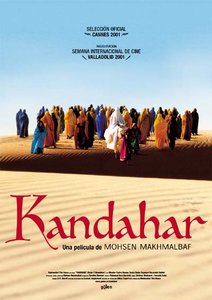
Kandahar is a 2001 Iranian film directed by Mohsen Makhmalbaf, set in Afghanistan during the rule of the Taliban. Its original Afghan title is Safar-e Ghandehar, which means "Journey to Kandahar", and it is alternatively known as The Sun Behind the Moon. The film is based on a partly true, partly fictionalized story of Nafas, a successful Afghan-Canadian woman played by Nelofer Pazira.

Brothers & Sisters is an American family drama television series that centers on the Walker family and their lives in Los Angeles and Pasadena, California. The series aired for five seasons on ABC from September 24, 2006, to May 8, 2011. For the entirety of its run, it was broadcast on Sunday nights following Desperate Housewives.

Cinema was introduced to Afghanistan at the beginning of the 20th century. Political troubles slowed the industry over the years; however, numerous Pashto and Dari films have been made both inside and outside Afghanistan throughout the 20th century. The cinema of Afghanistan entered a new phase in 2001, but has failed to recover to its popular pre-war status.
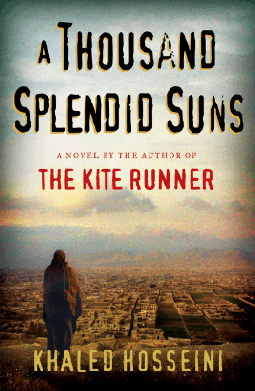
A Thousand Splendid Suns is a 2007 novel by Afghan-American author Khaled Hosseini, following the huge success of his bestselling 2003 debut The Kite Runner. Mariam, an illegitimate teenager from Herat, is forced to marry a shoemaker from Kabul after a family tragedy. Laila, born a generation later, lives a relatively privileged life, but her life intersects with Mariam's when a similar tragedy forces her to accept a marriage proposal from Mariam's husband.

Women's rights in Afghanistan have oscillated back and forth depending on the time period as well as the regime in power. After King Amanullah Khan's attempts to modernize the country in the 1920s, women officially gained equality under the 1964 Constitution. However, these rights were taken away in the 1990s through different temporary rulers such as the mujahideen and the Taliban during the Afghan civil war. During the first Taliban regime (1996–2001), women had very little to no freedom, specifically in terms of civil liberties. When the Taliban was overthrown by the United States following the 9/11 attacks, women's rights gradually improved under the presidential Islamic Republic of Afghanistan. Women were de jure equal to men under the 2004 Constitution.

Nora Twomey is an Irish animator, director, screenwriter, producer and voice actress. She is best known as the co-founder of Cartoon Saloon, alongside Tomm Moore and Paul Young, an animation studio and production company, based in Kilkenny City, Ireland. She is best known for co-directing The Secret of Kells and directing The Breadwinner. Her work on both films earned Academy Award nominations for Best Animated Feature.
Bibi Aisha is an Afghan woman who fled from an abusive marriage she was forced into as a teenager, but was caught, jailed, mutilated and left to die as revenge for her escape. She was later rescued by aid workers and her story was featured in American news as an example of the effects of the Taliban's reign of terror on women. As of 2014, she lives in Maryland as the adoptive daughter of an Afghan-American couple and has received reconstructive surgery.
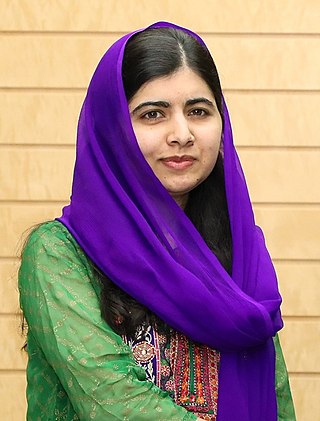
Malala Yousafzai is a Pakistani female education activist and the 2014 Nobel Peace Prize laureate at the age of 17. She is the youngest Nobel Prize laureate in history, the second Pakistani and the only Pashtun to receive a Nobel Prize. Yousafzai is a human rights advocate for the education of women and children in her native homeland, Swat, where the Pakistani Taliban had at times banned girls from attending school. Her advocacy has grown into an international movement, and according to former Prime Minister Shahid Khaqan Abbasi, she has become Pakistan's "most prominent citizen."
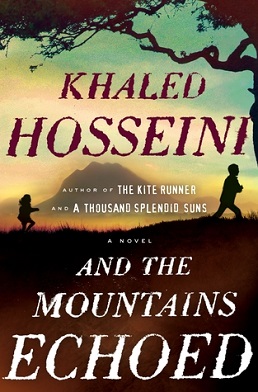
And the Mountains Echoed is the third novel by Afghan-American author Khaled Hosseini. Published in 2013 by Riverhead Books, it deviates from Hosseini's style in his first two works through his choice to avoid focusing on any one character. Rather, the book is written similarly to a collection of short stories, with each of the nine chapters being told from the perspective of a different character. The book's foundation is built on the relationship between ten-year-old Abdullah and his three-year-old sister Pari and their father's decision to sell her to a childless couple in Kabul, an event that ties the various narratives together.
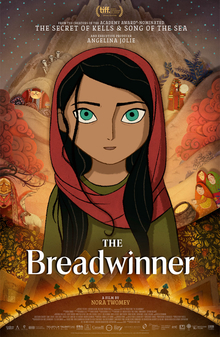
The Breadwinner is a 2017 animated drama film from Irish animation studio Cartoon Saloon directed by Nora Twomey. Based on the best-selling novel by Deborah Ellis, the film was an international co-production among Canada, the Republic of Ireland and Luxembourg, and received a limited release on 17 November 2017.

Hyena Road is a 2015 Canadian war drama film directed, written and produced by Paul Gross, starring Gross and Rossif Sutherland. It was shown in the Gala Presentations section of the 2015 Toronto International Film Festival. The film was shown on 24 September 2015, at the Calgary Film Festival, before a general release on 9 October. It won three Canadian Screen Awards.
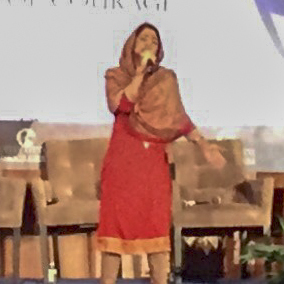
Sonita Alizadeh is an Afghan rapper and activist who has been vocal against forced marriages. Alizadeh first gained attention when she released "Brides for Sale," a video in which she raps about daughters being sold into marriage by their families. With the help of Rokhsareh Ghaem Maghami, an Iranian documentary filmmaker who over three years documented her story in the film Sonita, Alizadeh filmed the video to escape a marriage her parents were planning for her, even though it is illegal for women to sing solo in Iran, where she was living at the time. After releasing the video on YouTube, Alizadeh was contacted by the Strongheart Group, which offered her a student visa and financial help to come and study in the United States of America, where she then relocated and has resided since. In 2015, she was listed as one of BBC's 100 Women.

Whiskey Tango Foxtrot is a 2016 American biographical war comedy-drama film, directed by Glenn Ficarra and John Requa and written by Robert Carlock. It is based on the memoir The Taliban Shuffle: Strange Days in Afghanistan and Pakistan by Kim Barker. The film stars Tina Fey, Margot Robbie, Martin Freeman, Alfred Molina, and Billy Bob Thornton. It was released on March 4, 2016, by Paramount Pictures. It received mixed reviews from critics who praised the acting, but criticized the predictable screenplay and execution. The movie grossed $24.9 million against its $35 million budget.

Roya Sadat is an Afghan film producer and director. She was the first woman director in the history of Afghan cinema in the post-Taliban era, and ventured into making feature films and documentaries on the theme of injustice and restrictions imposed on women. Following the fall of the Taliban regime in the country, she made her debut feature film Three Dots. For this film she received six of nine awards which included as best director and best film. In 2003,A Letter to the President her most famous film that received many international awards, she and her sister Alka Sadat established the Roya Film House and under this banner produced more than 30 documentaries and feature films and TV series. She is now involved to direct the opera of A Thousand Splendid Suns for the Seattle Opera and she is during pre production of her 2nd feature film Forgotten History.



















